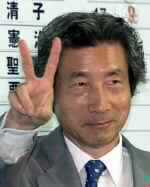TOKYO (AP) - Japan's ruling coalition swept to victory Sunday in elections for the upper house of Parliament, a vote of confidence the popular prime minister said would build steam for his plans to overhaul the stagnant economy.
The three-party coalition, led by Prime Minister Junichiro Koizumi's Liberal Democratic Party, won 78 of the 121 seats up for election in the 247-member upper house, the weaker of Parliament's two chambers. The coalition had needed to win at least 63 seats to keep its majority.
An exhausted Koizumi, who enjoys 70 percent approval ratings and the popularity of a rock star, said the results are a boon to his plans to restructure the economy, which is stuck in the 11th year of a painful slowdown.
Koizumi warned, however, that ill-effects linked to the reforms - high unemployment, for example - would probably delay a full recovery for Japan's economy by two or three years.
Sunday's results were a dramatic reversal of fortunes for the Liberal Democrats, who just a few months ago were led by the deeply unpopular Prime Minister Yoshiro Mori and had been expected to suffer badly in the upper house vote.
But Koizumi stormed to power in April with ambitious plans of overturning the LDP's long-standing pork-barrel politics by slashing public spending, cleaning up a bad debt crisis and dismantling regulations that protect large sectors of the economy.
Early Monday, national broadcaster NHK and other media reported that of the ruling coalition, the LDP won 64 seats, the Komei Party 13 seats and the Conservative Party one seat, giving the alliance slightly expanded clout in the chamber.
Full official results were not to be available until late Monday morning. Koizumi is a member of the powerful lower house and was not a candidate on Sunday.
The premier's allies in the LDP were quick to claim a mandate for change.
The opposition, meanwhile, conceded defeat, bowing to widespread public support for Koizumi.
NHK reported turnout was 56 percent, down 2.4 percentage points from the last upper house election in 1998. Nearly 102 million people in Japan are eligible to vote.
It was unclear whether the victory would translate into an easier ride for Koizumi.
He faces stiff opposition in the conservative wing of his own party, and many of the LDP's supporters in the countryside will be hurt by his reforms. During his campaign, Koizumi suggested that he would rather split the LDP than bend to anti-reformists within the party.
LDP old-guard lawmaker Mikio Aoki, however, said it was natural that lawmakers who were helped to victory by Koizumi would now support his proposals.
Koizumi also faces some resistance among people worried that his reforms will impose too much pain and that he will fail to put adequate safeguards in place to help those put out of work. The jobless rate is already at a record 4.9 percent, and the stock market hit a 16-year low over the past week.
Half the seats in the 247-member upper house go up for election every three years. The ruling coalition holds 61 seats that were not up for election this year.
PHOTO CAPTION:
Japanese Prime Minister Junichiro Koizumi gives a victory sign in front of a list of names of elected candidates of the ruling Liberal Democratic Party at LDP headquarters in Tokyo July 29, 2001. Just hours after leading his ruling coalition to victory in Upper House elections, Koizumi said he would compile concrete steps based on his painful but vital reform promises. (Toshiyuki Aizawa/Reuters)
- Author:
AP - Section:
WORLD HEADLINES


 Home
Home Discover Islam
Discover Islam Quran Recitations
Quran Recitations Lectures
Lectures
 Fatwa
Fatwa Articles
Articles Fiqh
Fiqh E-Books
E-Books Boys & Girls
Boys & Girls  Ramadan
Ramadan Fatwa Audios
Fatwa Audios Month of Mercy
Month of Mercy Women
Women Eed Al- Fitr
Eed Al- Fitr Food Recipes
Food Recipes Videos
Videos

 Prayer Times
Prayer Times












